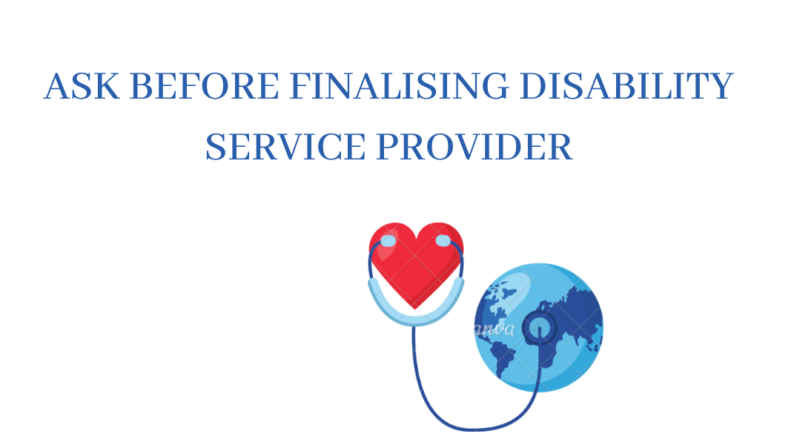7 Important Questions to Ask Before Finalising Disability Service Provider
You’ll probably need assistance along the way whether you have a physical or mental disability yourself or someone you care for. Hiring disability support in Tarneit is a significant step for disabled person, their families, and anybody else engaged with them, whether they pay for them out of pocket or with government money through programmes like the NDIS.
Many types of disability services are acceptable for various care demands because of how delicate and sensitive particular disabilities can be. Finding a reputable provider and working with that provider to get high-quality disability services are the responsibilities of people with disabilities and their carers.
Finding a reputable provider of disability services is a crucial first step for people with disabilities because it allows them to establish greater degrees of dependency while growing. Let’s look at the questions you need to ask before hiring a professional disability service provider.
Consider Your Goals
First, review your short- and long-term goals in your NDIS plan. Consider who’s assistance you require to accomplish these aims. Consider wanting to learn an instrument or some other new talent. If transportation is a problem, you might need an instructor to guide you as you know and a support person to drive you to lessons. You may require specific doctors or specialists to guide you through improving your health and support staff to drive you to appointments.
Identifying what you need from a supplier is the first step in making the best pick. Do you prefer someone who will give you advice over someone who will be more hands-on? Are you seeking someone to assist you in achieving particular objectives or someone with more experience in providing everyday care?
You must supply the answers to these questions to exclude disability support in Altona providers who might not fit you best. It’s easy to compare numerous respectable possibilities because there are so many diverse disability care providers with unique approaches and ideologies.
Questions You Must Ask
1. What can they offer?
On the other hand, it’s crucial to understand what NDIS service providers can give. Some service providers, such as eye doctors and chiropractors, are highly specialised. Others carry out broad responsibilities, such as support personnel. They can provide transportation for NDIS members to appointments, help with activities of daily living like eating and taking a shower, household chores like cleaning, and other forms of support. Depending on your NDIS plan, you might require a combination of specialists and generic support staff.
2. Are they flexible?
Although having a provider who satisfies all theoretical requirements is excellent, is working with them feasible? Consider the distance you or they would have to travel, and determine whether there are additional expenses for rescheduling or cancelling obligations.
Finding the ideal provider to discover that you must travel more than an hour to see them is pointless. Remember that receiving disability support in Tarneit should make life more accessible for the disabled person, not vice versa.
3. Do you get along with them?
You must determine if the prospect is a good fit for you based on various early impressions, just like with any job interview. If someone’s approach seems suspect to you or you don’t believe you can work with them, you should be able to sense it immediately in your gut.
They should be able to communicate with you without any problems by speaking your language. They ought to be good listeners who make sensible recommendations supported by education and research.
Above all, they must always show courtesy and cooperation. Instead of patronising persons with disabilities, they encourage and assist them in achieving their objectives. For this reason, the supplier of disability services must establish a trusting relationship.
4. Do they have experience?
While unregistered providers might need to be more familiar with NDIS plans, registered NDIS providers have expertise working with NDIS participants. There’s no reason to stay away from unregistered providers if you’re self-managing your plan or working with a plan manager; you can choose to engage with any provider you like. To ensure that you and the provider are on the same page regarding payments, service agreements, and your NDIS goals, inquire about the providers’ NDIS experience.
5. Do they charge an extra price?
The NDIS price guide specifies the maximum prices for supports that may be incurred. Participants are responsible for the costs over this level; however, the NDIS will only cover up to that amount.
Inquire about additional fees with your providers. These can include establishment expenses (when providers charge your NDIS plan a setup fee at the beginning of service) or gap fees (where a provider charges more than the NDIS authorised amount and the participant is responsible for the difference). Ensure all charges are included in your service agreements and a detailed description of the work’s scope.
6. What is their availability?
Many disability support in Altona offer flexible scheduling to meet the needs of participants. You can locate service providers available late at night, on weekends, and during holidays; nevertheless, you should clarify timetable expectations in advance to avoid misunderstandings. Inquire about the providers’ availability, then pick those whose schedules fit your requirements.
7. What is their cancellation policy?
Your demands may vary as you accomplish your NDIS goals. It’s possible that you won’t need the exact services you need right now. Providers frequently demand advance notice before terminating or changing service agreements. So that you can prepare, ask service providers about their cancellation or modification procedures.
Connect with Horizon Access for The Best Disability Services
Asking these seven crucial questions is crucial before choosing a supplier of disability services. To guarantee the finest care and assistance for people with disabilities, it is essential to have clear communication and transparency and the necessary skills and expertise. Families and individuals can receive the appropriate services and improve their quality of life by making an informed decision.


